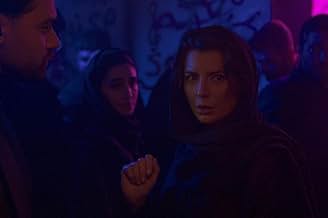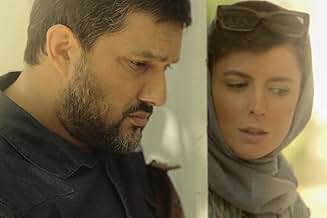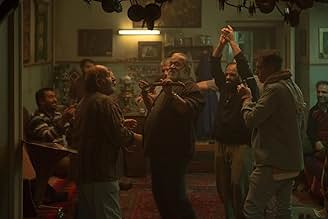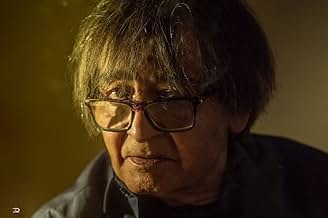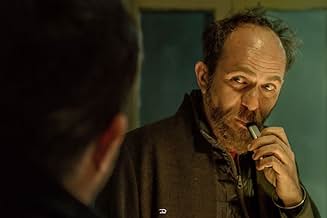Ajouter une intrigue dans votre langueTwo Iranian brothers live with their abusive father. When he rents to a young woman planning to marry her, her attraction to the older son creates tension in their already fractured family.Two Iranian brothers live with their abusive father. When he rents to a young woman planning to marry her, her attraction to the older son creates tension in their already fractured family.Two Iranian brothers live with their abusive father. When he rents to a young woman planning to marry her, her attraction to the older son creates tension in their already fractured family.
- Réalisation
- Scénario
- Casting principal
- Récompenses
- 3 victoires et 1 nomination au total
Avis à la une
I stayed with the film until the end. As we were leaving the cinema, most people seemed to be praising it. But I couldn't shake the feeling that something was off-I wasn't satisfied. I asked myself: beyond all its claims, what kind of experience did this film actually give me?
Pirpesar, directed by Oktay Baraheni, is a long film that manages to keep the viewer engaged-not through the strength of its storytelling, but by relying on familiar cinematic devices like romantic rivalry and erotic suggestion that cleverly manipulate the audience's attention. The film tries to appear profound and impactful, but the message it claims to carry is no more compelling than its flawed narrative execution.
Much of the film is weighed down by unnecessary and poorly constructed scenes, and several performances are noticeably weak. The director's limited understanding of key characters results in portrayals that feel shallow or misguided. The film's conceptual contradictions do not stem from its literary references-such as The Brothers Karamazov or Shahnameh-but from weak authorship and a lack of narrative coherence. While one or two actors do shine, overall this is not a successful film. It's a work that, more than anything else, seems crafted to satisfy the pseudo-intellectual viewer who's looking for symbolic depth where little truly exists.
Pirpesar, directed by Oktay Baraheni, is a long film that manages to keep the viewer engaged-not through the strength of its storytelling, but by relying on familiar cinematic devices like romantic rivalry and erotic suggestion that cleverly manipulate the audience's attention. The film tries to appear profound and impactful, but the message it claims to carry is no more compelling than its flawed narrative execution.
Much of the film is weighed down by unnecessary and poorly constructed scenes, and several performances are noticeably weak. The director's limited understanding of key characters results in portrayals that feel shallow or misguided. The film's conceptual contradictions do not stem from its literary references-such as The Brothers Karamazov or Shahnameh-but from weak authorship and a lack of narrative coherence. While one or two actors do shine, overall this is not a successful film. It's a work that, more than anything else, seems crafted to satisfy the pseudo-intellectual viewer who's looking for symbolic depth where little truly exists.
I go to the cinema maybe once a year to see an Iranian movie -based on the comments and suggestions from my friends and colleagues- and most of the time, I went out of the cinema satisfied enough for the time I've spent for that; this time... Not at all! It was 3+ hour total waste of time including ridiculous dialogues and unbelievably bad acting even from good actors, thanks to the bad directing I guess! The music and sound effects was so bad we joked that they don't have any auditory sense at all! And too many flaws in the storyline! Many nonsense dialogues that do not even follow the logic of the story itself.
The thing is, Iranian cinema is very thirsty for taboo topics thanks to the religious regime and the heavy censorships in the country, and once a movie touched one of those taboos, the movie gets too many credits, even with a rubbish directing and production, and I do not understand why such weak movies receives international prizes! Maybe the jury committee should forget about the name of the country while watching the movie and score it based on the artistic values, not the political ones.
The thing is, Iranian cinema is very thirsty for taboo topics thanks to the religious regime and the heavy censorships in the country, and once a movie touched one of those taboos, the movie gets too many credits, even with a rubbish directing and production, and I do not understand why such weak movies receives international prizes! Maybe the jury committee should forget about the name of the country while watching the movie and score it based on the artistic values, not the political ones.
The Old Boy is one of those rare cinematic experiences that captivates the viewer from its very first moments. With a cohesive narrative, well-crafted dialogue, and deep character development, this film not only delivers a satisfying movie experience, but it lingers in the viewer's mind long after the credits roll.
The film's greatest strength lies in its flawless combination of storytelling, acting, and visual design. The visual effects are stunning-not only do they enhance the scenes, but they help define the tone of the film. The meticulous production design and lighting distinguish The Old Boy from many domestic and even international productions.
The performances are exceptional. The cast is perfectly chosen, and each actor brings a unique psychological depth to their character. The ensemble's chemistry is clearly felt, and it keeps the story grounded in believability at every moment.
Despite having a relatively classic narrative structure, the film surprises the audience with creative and powerful moments. Its key plot points are smartly placed and paced without any rush, creating a balanced rhythm that feels neither too slow nor too fast.
Ultimately, The Old Boy is a successful example of cinema that appeals to both mainstream audiences and artistic sensibilities. It deserves to be watched, analyzed, and praised.
The film's greatest strength lies in its flawless combination of storytelling, acting, and visual design. The visual effects are stunning-not only do they enhance the scenes, but they help define the tone of the film. The meticulous production design and lighting distinguish The Old Boy from many domestic and even international productions.
The performances are exceptional. The cast is perfectly chosen, and each actor brings a unique psychological depth to their character. The ensemble's chemistry is clearly felt, and it keeps the story grounded in believability at every moment.
Despite having a relatively classic narrative structure, the film surprises the audience with creative and powerful moments. Its key plot points are smartly placed and paced without any rush, creating a balanced rhythm that feels neither too slow nor too fast.
Ultimately, The Old Boy is a successful example of cinema that appeals to both mainstream audiences and artistic sensibilities. It deserves to be watched, analyzed, and praised.
The Old Bachelor," directed by Oktay Barahani, was for me more than just a typical drama. With Hassan Pourshirazi's outstanding performance as Gholam Bastani, the film skillfully portrays the archetype of the "Puer Aeternus" or "Eternal Youth." This character, despite his age, remains emotionally stunted, refusing to embrace the responsibilities of adulthood.
This interpretation is reinforced by Gholam's own pivotal dialogue: "A man whose life has no rules or order, even if he grows old, will remain an old boy and never truly grow up!" Furthermore, one can observe echoes of "Dionysus," the god of ecstasy and liberation, within Gholam Bastani, which perfectly complements the "Eternal Youth" aspect of his character. This is a profound and thought-provoking film that delves into the psychological layers of humanity.
This interpretation is reinforced by Gholam's own pivotal dialogue: "A man whose life has no rules or order, even if he grows old, will remain an old boy and never truly grow up!" Furthermore, one can observe echoes of "Dionysus," the god of ecstasy and liberation, within Gholam Bastani, which perfectly complements the "Eternal Youth" aspect of his character. This is a profound and thought-provoking film that delves into the psychological layers of humanity.
10Ahmiek-2
A new outlook for a persian movie. Director all does his best and a great scenario performed. The casting is great leila hatami a great Iranian actress acting well and pourshirazi is just too good despite his character's mental complications. Btw I think this movie will achieve international praises. Just like what asghar farhadi did to iran cinema.
Meilleurs choix
Connectez-vous pour évaluer et suivre la liste de favoris afin de recevoir des recommandations personnalisées
Détails
- Date de sortie
- Pays d’origine
- Langue
- Aussi connu sous le nom de
- The Old Bachelor
- Société de production
- Voir plus de crédits d'entreprise sur IMDbPro
- Durée3 heures 12 minutes
- Couleur
Contribuer à cette page
Suggérer une modification ou ajouter du contenu manquant


![Regarder Trailer [OV]](https://m.media-amazon.com/images/M/MV5BNDAyMzdjYmEtZDY2ZC00ODdmLTkyNjAtNDAxZGFmMmJiZmZjXkEyXkFqcGdeQXRyYW5zY29kZS13b3JrZmxvdw@@._V1_QL75_UX500_CR0)
